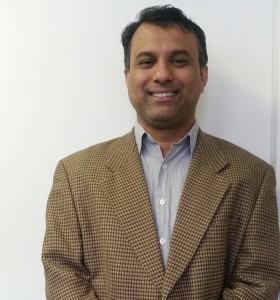Bhutan native helps refugees become self-sufficient

By Rob Levey
Born in Bhutan, a tiny Himalayan country in-between China and India, Subash Acharya has come to consider Manchester his home. His journey to the Granite State, however, was anything but easy.
“When I got evicted (from Bhutan) along with my parents, I was a 12-year-old kid,” he said. “I came to the United States through a third-country resettlement program operated by United Nations High Commissioner for Refugees (UNHCR) in collaboration with the International Organization for Migration and the US government in 2011.”
Previous to his arrival in New Hampshire, Acharya said he lived in a refugee camp in Nepal for 18 years. His past, however, has fueled his career aspirations as employment coordinator at Services for New Americans, a program of Ascentria Care Alliance.
In such a capacity, he works to not only resettle refugees and immigrants, but to make them self-sufficient. He also prepares refugees for job interviews through regular orientations and trainings on U.S. work ethics and interview skills.
“It is challenging to train people who never worked back in their home country and do not speak English, but it has been possible thus far,” he said. “Our program has been successful to employ people with zero English in full-time jobs and make them self-sufficient.”
As for his recipe for success, he said he balances his time between his career, his family (wife and three children), and school (he is pursuing a bachelor’s degree in Health and Human Services from Springfield College in Manchester). According to Acharya, it is not how many things one does that potentially causes stress, but rather how an individual perceives things around him/her.
“I take things easy and stay calm — life is a flow of water with waves and tides,” he said. “If you make use of the waves and tides, there is high potentiality of generating current that changes the outlook of the entire world.”
In looking toward the future, though, Acharya cannot forget where he was born and the injustices that he noted continue to this day.
“There is a dictator in the country that still dictates the country in the name of democracy,” he said. “He has been able to “eyewash” the international communities that there is democracy in the country and everybody is free and happy, but that is a lie. I would love to return to Bhutan if situation in Bhutan gets normalized and we are protected. I miss my birth place so much.”
___________________
Subash Acharya, 36
Home: Concord
Birthplace: Tsirang, Bhutan (a tiny Himalayan country sandwiched between China and India, and dictated by a king).
Family: Wife, three kids, parents and a brother.
High school: Tri-Ratna Secondary School; a school in a refugee camp in Nepal accredited by Education Ministry of Nepal.
College/post grad degrees: Bachelor of science from Trivhuwan University in Nepal. Pursuing another bachelor’s degree from Springfield College in Manchester, on health and human services.
Current job: Employment coordinator at Services for New Americans, a program of Ascentria Care Alliance.
Key past positions held: 1. Direct support provider, Community Bridges in Concord for two years. 2. Case worker, Lutheran Social Services for two years. 3. Education and employment specialist, Ascentria Care Alliance for two years. 4. Employment coordinator, Ascentria Care Alliance since March 2015.
Volunteer activities: 1. Camp secretary (liaison between refugee communities, aiding agencies like UNHCR, WFP and so forth and the government of Nepal for two years while in Nepal). 2. Teacher (incentive volunteer in refugee camp school for two years in Nepal). 3. Frontline unofficial volunteer in Bhutanese community in New Hampshire helping them (newly arrived Bhutanese refugees) on as-needed basis, from interpretation to reading their mails, to transporting them to their appointments, to helping them to navigate and apply for resources available locally. I do this apart from my work.
Key current professional challenge: Getting jobs for those refugees who do not speak English. There is no federal funding for refugees after six months, and refugees have to start working and be self-sufficient as quickly as possible.
Biggest problem facing New Hampshire: Cost of living is expensive, especially housing cost, and people have not been able to afford living here because the monthly income people make from work is still lower than their living cost. However, there are several ways to explore other possibilities and make citizens’ life easier.
Source: Union Leader
